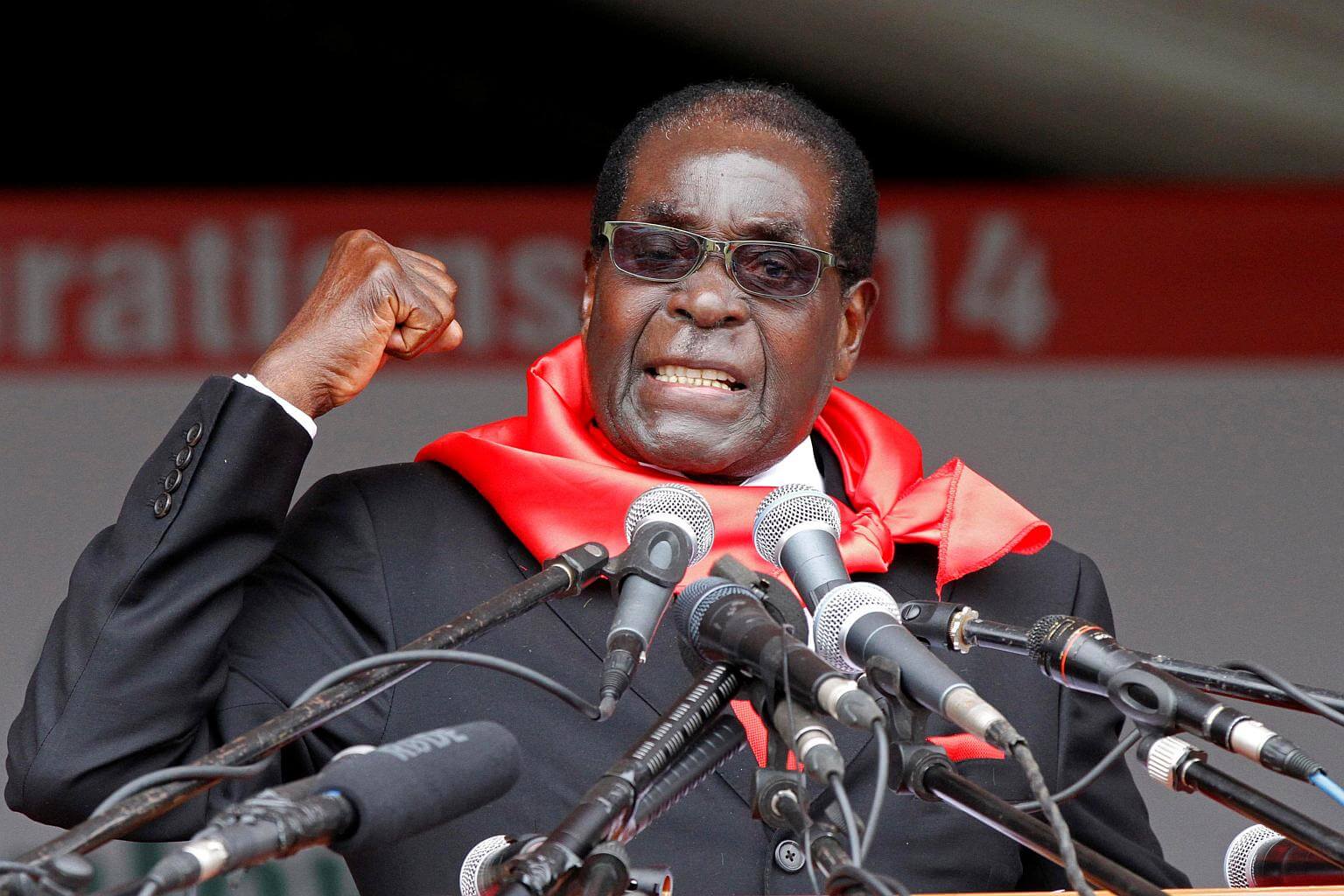There’s no going back, Zimbabwe ruling party tells President Mugabe
Sign up now: Get ST's newsletters delivered to your inbox

Zimbabwe President Robert Mugabe addresses supporters during celebrations to mark his 90th birthday in Marondera.
PHOTO: REUTERS
Follow topic:
HARARE (REUTERS, AFP) - Leaders of Zimbabwe's ruling ZANU-PF party are meeting on Friday (Nov 17) to draft a resolution to dismiss President Robert Mugabe at the weekend and lay the ground for his impeachment next week if he refuses to stand down, a senior party source said.
"There is no going back," the source told Reuters. "If he becomes stubborn, we will arrange for him to be fired on Sunday. When that is done, it's impeachment on Tuesday."
Mr Mugabe's fate hung in the balance as he apparently resisted efforts to make him step down following a seizure of power by the army, until this week a key pillar of his 37-year-rule.
The military said on national television it was holding talks with Mr Mugabe on the way forward and that it would advise the nation on their outcome as soon as possible. It added that it had made "significant progress" in its operation targeting "criminals" around Mr Mugabe.
Mr Mugabe has refused to resign after meeting generals who have seized control of the country, as sources suggested the veteran leader was "buying time" to negotiate his exit.
The talks in Harare on Thursday came after soldiers this week put Mr Mugabe under house arrest, took over state TV and blockaded main roads in a stunning turnaround for the 93-year-old leader who has ruled the country with an iron fist since 1980.
Mr Mugabe's motorcade took him from his private residence to the State House for the talks, which were also attended by envoys from the Southern African Development Community (SADC) regional bloc.
"They met today. He is refusing to step down. I think he is trying to buy time," said a source close to the army leadership who declined to be named.
Government TV showed Mr Mugabe, the world's oldest head of state, dressed in a navy blue blazer and grey trousers standing alongside army chief General Constantino Chiwenga who smiled and was dressed in fatigues.
Zimbabwe was left stunned by this week's military intervention but attention has swiftly shifted to the prominent figures who could play a role in any transitional government.
Mr Mugabe's advanced age, poor health and listless public performances have fuelled a bitter succession battle between his wife Grace and former vice-president Emmerson Mnangagwa, whom Mr Mugabe sacked last week.
Mr Mnangagwa, 75, was previously one of Mr Mugabe's most loyal lieutenants, having worked alongside him for decades. But he fled to South Africa following his dismissal and published a scathing rebuke of Mr Mugabe's leadership and Mrs Mugabe's presidential ambitions. His aide told the AFP he had returned to the country on Thursday.
The generals are strongly opposed to Mrs Mugabe's rise, while Mr Mnangagwa has maintained close ties to the army and could emerge as the next president.
Mr Morgan Tsvangirai, a former prime minister and long-time opponent of Mr Mugabe, told journalists in Harare that Mr Mugabe must resign "in the interest of the people". He added that "a transitional mechanism" would be needed to ensure stability.
Mr Tendai Biti, who served as finance minister during the coalition government after the 2008 elections, called it "a very delicate time for Zimbabwe".
"A way has to be worked out to maintain stability. That restoration requires a roadmap and to address the grievances that have led to this situation," he said.
The African Union (AU) said it would allow Zimbabwe's southern neighbours in the SADC to mediate in the crisis.
Mr Smail Chergui, the AU commissioner for peace and security, said Africa was putting its faith in the efforts of the SADC, noting that its envoys had been able to meet Mr Mugabe, after talks in Washington.
"I think as we speak the Parliament is still in force, is still working, the government is still working, and there is no sign of violence whatsoever in the country," Chergui said.
Professor Eldred Masunungure, a lecturer at the University of Zimbabwe, said the formation of a "pre-election coalition" could be a viable response to the crisis. Many Zimbabweans hoped the situation would pave the way to a more prosperous future.
"We needed change. Our situation has been pathetic," said Keresenzia Moyo, 65.
"The economy has been in the doldrums for a very long time. We are happy with what has been done."
The international community has been watching the crisis closely. In Paris, the head of the AU, Guinea's President Alpha Conde, warned that the continent "will never accept the military coup d'etat" in Zimbabwe and called for a return to the "constitutional order".
"(Problems) need to be resolved politically by the ZANU-PF party and not with an intervention by the army," added Mr Conde.
Meeting in Botswana, the SADC called for an emergency regional summit to help resolve the crisis, urging Zimbabwe to "settle the political challenges through peaceful means".
Britain, Zimbabwe's former colonial ruler, demanded that elections scheduled for 2018 go ahead.

